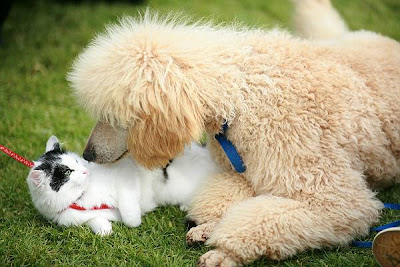




One of the first things that you should concentrate on is to teach the puppy its name. Pick a simple name and use it always when you talk to your puppy so that the puppy gets used to hearing it. Make sure that the puppy connects hearing its name with something good like praise or a treat. Start the training gently and don't be harsh. Puppies and all dogs learn through repetition so you must be patient, you probably won't see results overnight. Talk to your puppy a lot and establish communication with it. This relationship will draw the two of you closer together. A good piece of puppy training advice that will save you a lot of frustration is, if the puppy can't learn a certain thing, switch to something else. Another tip is to make the lessons brief so that the puppy doesn't get bored.
As was mentioned before, you must reward or reinforce the puppy for the response that you want. This can be with praise and treats or just praise. Remember to give the reward immediately as a puppy's memory is very short. If you have to correct or discipline, a disgusted voice is usually enough. If you need more force, make a startling noise by hitting a rolled up newspaper against your knee or some object. Avoid using your hand to hit the dog, if you must, make sure that it is just a light tap.
Basic training consists of name recognition, the "No" command, "Quiet" and house training (housebreaking). Talk to the puppy a lot and start with only a few minutes a day of training and lots of play time. The best puppy training advice is to keep at it, be patient and don't let either you or the puppy get bored. Follow these basic steps and you should be on your way to successfully training your puppy.

"My baby, I don't have much money, I can't afford to buy you diamond rings, and I'm unable to propose marriage at romantic heaven, but, a voice in my heart is: you are my only love, so, I got up early in the morning, and picked the finest rose to you from the highest hill of our city. You are the only one who I want to live with, I hope you can take me to your heart, and take me to your soul, let's begin our new life!"














According to the FCI breed standard, hairlessness is the most important aspect of its appearance. On top of its head, on its feet, and on the tip of its tail, the dog may have short hair.
In Peru, breeders tend to prefer completely hairless dogs. The full-coated variety is disqualified from conformation showing. The color of skin can be elephant grey, chocolate-brown, copper, or mottled. They can be totally one color or one color with tongue pink spots. Albinism is not allowed. The eye color is linked to the skin color. It's always brown, but dogs with light colors can have clearer eyes than darker-skinned dogs.
The dogs should be slim and elegant, with the impression of force and harmony, without being coarse. And the ears should be candle-flame shaped and erect with the possibility to lay flat. In addition, proportions of height (at withers) to length (withers to base of tail) are 1:1.
Peruvian Hairless Dogs's Size
Small: 25 to 40 cm (10 to 16 inches)
Medium: 40 to 50 cm (16 to 20 inches)
Large: 50 to 65 cm (20 to 26 inches)
The smallest weighs from 4 kg (9 lb) and the largest up to 25 kg (55 lb).
Peruvian Hairless Dog's Temperament
Peruvian Hairless dogs are affectionate with family but wary of strangers. They are typically alert, lively and friendly with other dogs but can be protective as well. These dogs do not like to be alone, but when trained, can do well. These dogs are intolerant of extreme temperatures and are agile and fast. They generally require an owner that understands dog language and are not recommended for beginners.








Related article: Twins - Dog Behavior Pictures
We are sleeping, please leave us alone!
We are runners. Guess! Guess who will win!
We are the happiest lovers, do you envy us?
Do you think we are gorgeous?
Do you know what we are looking at?
We are narrowly pressed to dead!
